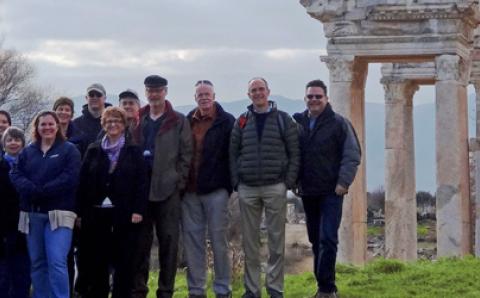Missionaries
As an ordinary congregant miles (or kilometers) removed from Grand Rapids, I cannot begin to understand why we are demanding that our God-called, faithful, and dedicated missionaries must now begin to raise 90 percent of their basic costs outside of ministry shares before they become eligible to be approved for the mission field or to stay if they are already abroad (“World Missions Explains the 90 Percent”). The Lord has called them to be fundraisers first?
Just where is our local families’ allocated ministry share of $14,353 intended to go in 2014?
This decision must not be allowed to stand.
—Ralph L. De Groot
Peterborough, Ontario
The Christian Reformed Church and the gatekeepers of World Missions have failed our missionaries (“World Missions Explains the 90 Percent”). We, as congregations, are not sending in our ministry shares to keep our missionaries financially afloat. Now these people who have sacrificed so much in the name of Christ must raise their own support. Shame on us!
We suggest the World Missions agency (those in the denominational building) go to each congregation and show how [they should] have a line item in their budget for each missionary they wish to support. That way missionaries know what their budget will be. And if one of our missionaries is falling short, CRWM should find a church to support them.
—Craig and Elaine Scheirman
Broomfield, Colo.
Two-in-One
As important as it is to reflect our unified Christian citizenship in Christ’s kingdom, it is equally important to contextualize or speak to the specific realities in our respective countries (“Two-in-One for the Three-in-One”). Binationality suggests that we live in two nations with different civic and social structures and patterns, and hence often specific issues to address.
The type of censorship witnessed recently regarding the necessary specific dialogue of issues of creation and human sexuality will only serve to discourage dialogue of other so-called “partisan” hot-button issues. So much for providing an honest forum for wrestling with issues specific to this decade of the 21st century relevant to our specific families, churches, communities, and nations.
—Henk Smidstra
Surrey, British Columbia
To compare our ongoing binationality struggle with Egyptian slavery or with the mystery of the Trinity is far-fetched (“Two-in-One for the Three-in-One”). Decades of tension and quandary have failed [to help us come] to a mutual understanding.
I am grateful for the assistance of people like John Vellinga (field man in Ontario), and a good number of our extended family have graduated from Calvin and Dordt.
In the meantime, we are not the immigrant community of 60 years ago but have established ourselves as Canadians. The time has come that we should not live in the shadow of our big brother any longer but establish ourselves as equal partners.
—Evert Wassink
Forest, Ontario
We clearly see two streams from the same source: Calvinism (Letters, “Promoting Dialogue,”). Immigrants who arrived after WW II were more informed about the neo-Calvinistic Kuyperian biblical worldview embracing God’s sovereignty in all aspects of life, daring to dialogue on controversial issues such as creation or human sexuality. The other stream—neo-Puritans—focuses on individual piety and church renewal.
—George Lieuwen
Langley, British Columbia
Interfaith Dialogue
I am deeply grateful that the CRC is increasingly recognizing the need for interfaith dialogue (“Christian Identity in a Multi-Faith World”).
I’d like to add that we need to distinguish between religion and faith. Wearing a hijab, eating fish on Fridays, not eating pork, and many other habits or customs all belong to the realm of religion, [while] the coming of God, caring for the poor, promoting a healthy family life, and many other aspirations belong to the realm of faith. I may have virtually nothing in common from a religious perspective with a Muslim, for example, but from a faith perspective I may have many things in common.
Second, we need to distinguish between biblical and theological language. “Kingdom of God,” for example, is primarily biblical, while “Trinity” is theological.
Third, I am only able to teach a Muslim when I am willing to be taught by that person. The process is mutual.
The kingdom is coming more and more every day.
—Simon Wolfert
Surrey, British Columbia
Alberta Dinosaur
You allowed an untrue statement in the story of the Alberta dinosaur skeleton (“Alberta Construction Crew Uncovers Dinosaur Skeleton”). The Bible chronology projects that the earth is about 6,000 years old, not the 68 million years [reported to be the age of the skeleton]. One can read the details of the seven-day creation in Genesis and one can read the scientific facts supporting creation at creation.com.
To deny a seven-day creation is to deny the Bible.
—Dick Van Veldhuisen
Brockville, Ontario
I am surprised that many seem to see the current discussion of creation and evolution as an either/or question. It seems obvious that much of creation has evolved over the centuries; witness the dinosaur fossils still being found (“Alberta Construction Crew Uncovers Dinosaur Skeleon”), the petrified forest in Arizona . . . and the variety of birds, animal, trees, flowers, and insects with the ability to do marvelous things!
Our universe was created by God, who governed the process of evolvement in such a way that what now is, has been determined by the actions of a very artistic God. Seeing it that way allows me to think of our universe as very old and yet very beautiful, filled with manifestations of God’s wisdom, creativity, and artistic management of a vast universe.
—Herman Salomons
Red Deer, Alberta
Adam and Eve’s Kids
Henry De Moor was asked to answer a simple question and instead of doing so he muddied the waters (“FAQs”). Let me answer it. Adam and Eve were our first parents. There were no other humans, so brothers and sisters had to marry each other. Creation was perfect. Because of the Fall, DNA began deteriorating. By the time Leviticus was written, close family members were instructed not to marry because the DNA of the human race had accumulated too many errors. Therefore, today it is taboo for close family members to marry.
Those of us who hold to a young earth theory have no problem affirming Adam and Eve, no problem upholding that there was no death or sickness before the Fall.
—Richard Vander Vaart
Sarnia, Ontario
Copresidents Leaving
The article gives the impression of ICS as a rudderless ship that is crashing into the rocks (“Copresidents Departing from Institute of Christian Studies”). To the contrary, at a programmatic level the ICS has never been more robust. The current cohort of students is excellent, as evidenced by the fact that nine currently enrolled students are sharing their work at academic conferences or in publications this year. Our excellent faculty continues to publish in the best academic presses and journals, and their courses remain exciting, challenging, and innovative.
—Ronald A. Kuipers, Director, Centre for Philosophy, Religion, and Social Ethics;
Dr. Douglas Blomberg, Acting President; Henriette Thompson, Chair, Board of Trustees
Your recent story on the departure of Dawn and Tom Wolthuis from the Institute for Christian Studies (“Copresidents Departing from the Institute of Christian Studies”) is one-sided and incomplete. To begin, it contains several factual inaccuracies that need to be directly challenged.
First, the story cites “sources close to ICS” who claim that “the presidents did not receive board support as they did necessary staff cutting that had been approved by the board. . . .” Obviously, the ICS Board supported the very cutbacks that they themselves mandated. Although the entire institution laments the fact that these measures were necessary, these cuts were discussed and supported by the entire institutional leadership (including, in addition to the Presidents, the Director of Finance and Administration; the Director of the Centre for Philosophy, Religion, and Social Ethics; and the Academic Dean).
Second, the article states that in late 2012, “financial statements showed that the school could accept students for only two more years unless it cut expenses by reducing faculty and staff and increased fundraising.” Prudent institutions make plans and projections based on the state of their current finances, and ICS is no exception. Reporting such a statement without further qualification, however, gives the misleading impression that ICS is closing its doors to incoming students this coming September. Of course, since 2012 we have taken measures that will allow us to continue to accept students this coming year and to commit to those accepted for the duration of their programs. In the meantime, we continue to work to bring ICS into a more fiscally sustainable future.
Anyone who knows anything about the history of ICS, including our wonderful donors and supporters, knows that it has been chronically underfunded for its entire existence. In that sense, today’s reality is not so different from yesterday’s, and, in fact, our current economic condition, at least for the near term, is much more stable than it has been at several crisis points throughout ICS’s history. In spite of these ongoing financial difficulties, ICS has survived and thrived for over 45 years, thanks to a group of passionate Christian intellectuals and administrative professionals who work for significantly less than market value because they strongly believe in ICS’s mission to integrate Christian faith and academic learning. Your article does their personal sacrifice for this important Christian cause a real disservice.
The article gives the impression of ICS as a rudderless ship that is crashing into the rocks. To the contrary, at a programmatic level the ICS has never been more robust. The current cohort of students is excellent, as evidenced by the fact that nine currently enrolled students are sharing their work at academic conferences or in publications this year. Our excellent faculty continues to publish in the best academic presses and journals, and their courses remain exciting, challenging, and innovative. Our research centre, the Centre for Philosophy, Religion, and Social Ethics, is partnering with The King’s University College to host a conference on economic justice in May 2014, where Bob Goudzwaard will be a plenary speaker. Last year, the CPRSE also secured a two-year $200,000 research grant to explore how people in the Christian Reformed Church understand the relationship between faith and justice. $80,000 of that grant flows directly into CRCNA coffers to pay CRC staff to partner with us in that project. Here we have ICS helping to fund CRC work, rather than the other way around! Some mention of these positive projects that are moving full steam ahead would have added some balance to this article.
Finally the article states that ICS has recently been running “deficit budgets” when actually, thanks to the generous bequest from the estate of Lowell Andreas, the budgets have been balanced. Unlike many of our sister institutions in Christian post-secondary education, ICS carries no debt. True, we are depleting the funds of that bequest, and we know we cannot continue this pattern indefinitely. While we are aware of the risk such spending involves, we see it as a strategic investment in our significant work, an investment that will ensure that ICS maintains its reputation as an institution of Christian graduate education worthy of generous financial support.
—Ronald A. Kuipers, Director, Centre for Philosophy, Religion, and Social Ethics; Dr. Douglas Blomberg,
Acting President; Henriette Thompson, Chair, Board of Trustees








